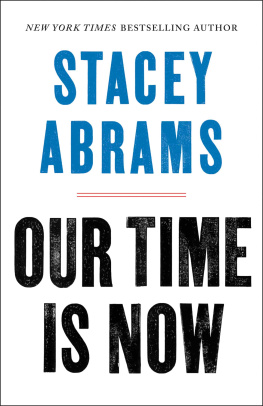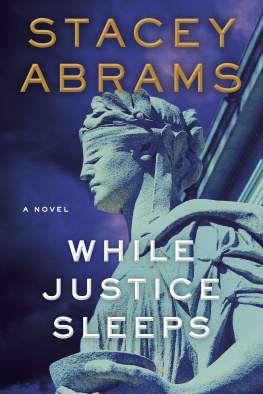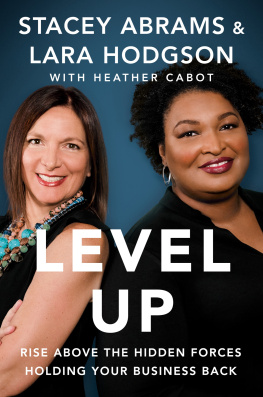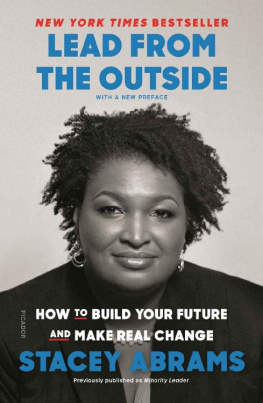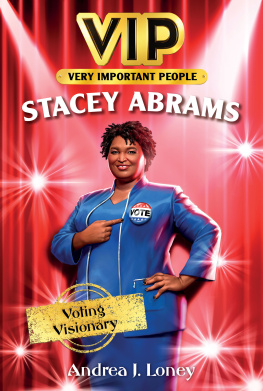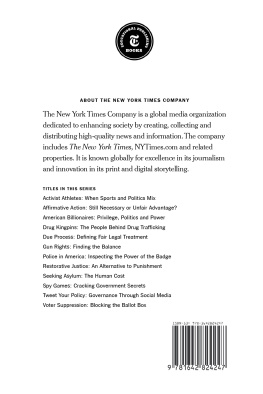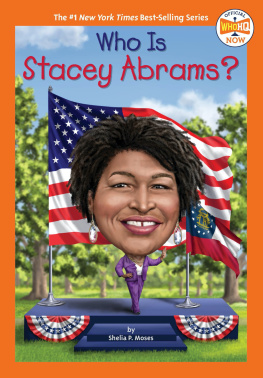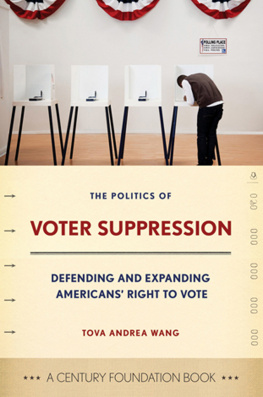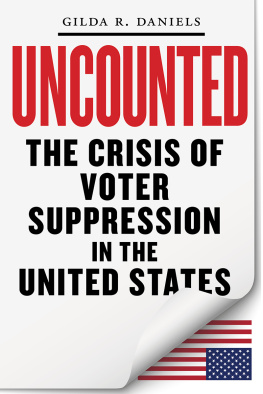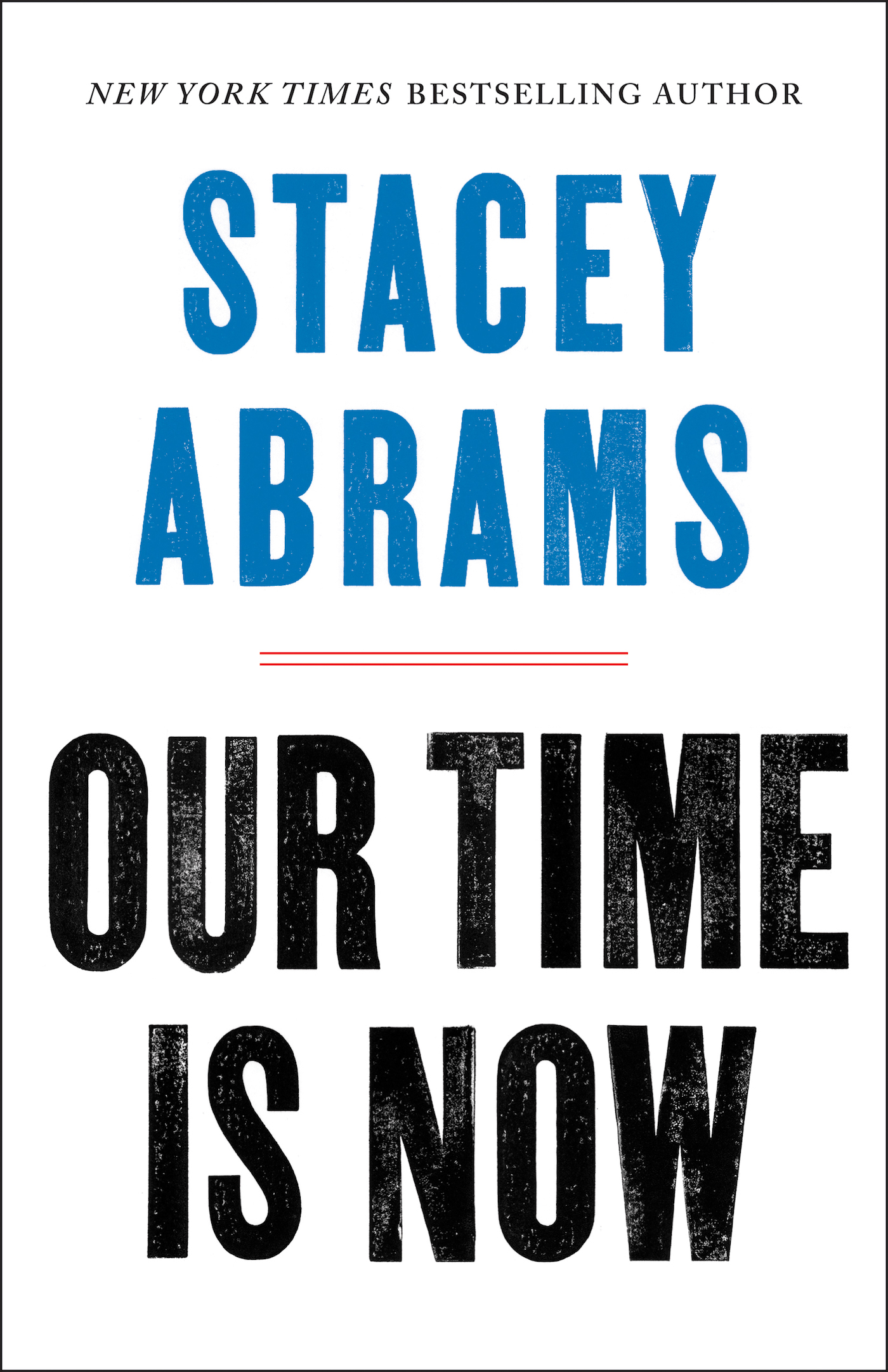The author and publisher have provided this e-book to you for your personal use only. You may not make this e-book publicly available in any way. Copyright infringement is against the law. If you believe the copy of this e-book you are reading infringes on the authors copyright, please notify the publisher at: us.macmillanusa.com/piracy.
To my grandparents, Wilter and Walter Abrams, Lillie Bell and James Hall, who gave me a legacy; to my parents, Robert and Carolyn, who gave me life; to my siblings, Andrea, Leslie, Richard, Walter, and Jeanine, who keep me grounded, and their spouses, Brandon, Nakia, and Jimmie, who stand with me; and to my nephews and nieces, Jorden, Faith, Cameron, Riyan, Ayren, and Devin, who give me hope.
In January 2019, my grandmother passed away. Wilter Abrams, known as Bill to family and friends, was a formidable woman. She gave birth to six children in a span of four yearstwo daughters and then two sets of twin boys, born in 1946, 1948, 1949, and 1950. She and my grandfather, Walter Abrams or Jim, raised five of their kids into adulthood in the crippling poverty of Mississippi and segregation, losing my fathers twin brother in his infancy. Neither of my grandparents had unexpressed opinions, and they brought their children up to also hold strong convictions. Both of my grandparents were cooks at the local state university, serving students at a school their own children could not attend.
My grandfather, a slender bantam of a man, served in World War II as a navy cook and fought as a boxer during his tour. When he got drafted into the Korean War, he did his duty again, knowing the entire time that he was returning to the segregation and racial venom of the Deep South. Bitterness fought with practicality as he returned twice to a country that denied him basic civil rights. In 2011, in the weeks before he passed, I left the special legislative session where we were drawing new political districts. I shared my frustration about the ways black and brown voters were being stripped of power. A man of colorful language, he basically warned me not to let the bastards get me down.
Just before the 2018 election, I traveled to my parents home in Hattiesburg, Mississippi. The detour from the campaign trail was unusual, but both a fundraising opportunity and a deep call to see my family brought me there. One evening, I went to the master bedroom my parents had ceded to my grandmother when she could no longer live alone. She sat in her favorite recliner, watching the news on MSNBC, cell phone in her lap. I perched on the edge of her bed. Grandma turned down the volume and she asked about my election. By then, national attention had been fixed on the voter suppression allegations against Brian Kemp and on the tight numbers in our contest. I explained the latest developments to her and vented about the worries I had carried from Georgia.
When I finished, she patted my hand. Then she told me about the first time shed ever voted. Like my grandfather, she had been incensed at the strictures of Jim Crow since childhood. Smart and quick, she had seen lesser minds advance because of racial discrimination. But she understood how the systems worked, and when her children became agitators in the civil rights movement, she warily supported their activism. Both she and my grandfather had been quieter in the movement because they understood the consequences if they got caught. Putting food on the table and keeping their house kept both of them primarily on the sidelines. But Grandma had faced the menacing growls of the massive dogs used to control protesting crowds, and she had been violently sprayed by the water hoses used to remind blacks of their place. Shed gathered up the bail money to free her teenage son from jail when he got arrested registering voters. At one point, the local police were calling her regularly to interrogate her about the protest actions of her children. By the time the Voting Rights Act passed in 1965, she understood its significance. But she also knew not to expect immediate change, and she was right. Across much of the South, the implementation came very slowly; thus her first real opportunity to vote didnt arrive until 1968.
That night, I listened to her talk and, suddenly, her voice grew tremulous. I worried that I had worn her out. But I quickly realized that the soft trembling came not from exhaustion but from shame. Quietly, she recounted the day of the election, how Granddaddy, his brother L.P., and others got ready to go and cast their first ballots in Mississippi. My dad would still be two years too young to vote, but she had the opportunity. Yet, she told me, she refused to leave her bedroom, where she sat paralyzed by fear. The laws had changed, but they had changed before. There was the promise of an emancipation that still left her great-grandparents enslaved, and the school desegregation that took nearly a decade to arrive. But the right to vote carried the most significant victoryand she did not believe this promise was real. She explained how my grandfather called for her to meet them at the front door, but she wouldnt budge. Finally, he stormed down the hall and into the shadowed room. Impatiently, he demanded to know what was taking her so long, when history awaited their arrival.
Grandma squeezed my hand as she remembered the explanation she gave to her husband: Im afraid, Jim. Im afraid of the dogs and the police. I dont want to vote. She covered my hand, and her eyes held mine. Stacey, your grandfather got so angry. He reminded me about your daddy and your aunts and uncles. All those young black children who fought so hard to get these rights. And there I was, afraid to use them. I was ashamed of myself. Instead of cowering in the bedroom, fearing the worst, she followed the example of her children, the call of her conscience. She screwed up her courage, gathered her purse and coat, and told my grandfather she was ready to go. Together, they traveled to the precinct to cast their very first ballots. By her side, she clutched my hand again, the paper-thin skin stretched tight. She leaned in to me and rasped, Im so proud of you, Stacey. I know I cant vote for you, but Im so very proud that my granddaughter is on the ballot and our people can be heard.
When I tell this story, its not because of my grandmothers pride in my campaign, although that means a lot to me. I use this story as a warning of the fear that even the most stalwart can feel about their exercising the power of the vote. A woman who had braved economic hardship and rabid racism recoiled not at the theft of power but the possibility of taking it. That perversion of democracy continues to play out across our country every day. Voter suppression works its might by first tripping and causing to stumble the unwanted voter, then by convincing those who see the obstacle course to forfeit the race without even starting to run.
A few months ago, my youngest sister, Jeanine, met some friends at a local restaurant for margaritas at the end of a long workweek. One of the women sitting around her table made a point of telling Jeanine that she had voted for me for governor. Jeanine started to thank her for the support, but the young woman wasnt done. She then told my sister she had no intention of voting again. Recounting stories shed heard about voters who had been sent to the wrong polling place or suddenly had their registration vanish, she said the entire process seemed too suspicious and, in the end, her vote didnt matter. She told Jeanine she saw malicious intent in the treatment of folks who couldnt afford gas for a second round-trip to the polls or had no available time off to fix problems. Disillusionment hit her that much harder because shed believed that the outcome could be different if she tried.


